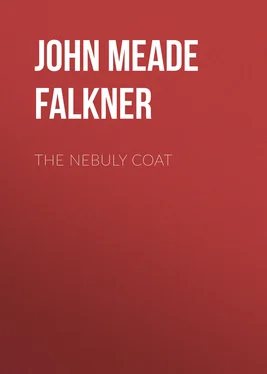John Meade Falkner - The Nebuly Coat
Здесь есть возможность читать онлайн «John Meade Falkner - The Nebuly Coat» — ознакомительный отрывок электронной книги совершенно бесплатно, а после прочтения отрывка купить полную версию. В некоторых случаях можно слушать аудио, скачать через торрент в формате fb2 и присутствует краткое содержание. Жанр: foreign_antique, foreign_home, architecture_book, на английском языке. Описание произведения, (предисловие) а так же отзывы посетителей доступны на портале библиотеки ЛибКат.
- Название:The Nebuly Coat
- Автор:
- Жанр:
- Год:неизвестен
- ISBN:нет данных
- Рейтинг книги:3 / 5. Голосов: 1
-
Избранное:Добавить в избранное
- Отзывы:
-
Ваша оценка:
- 60
- 1
- 2
- 3
- 4
- 5
The Nebuly Coat: краткое содержание, описание и аннотация
Предлагаем к чтению аннотацию, описание, краткое содержание или предисловие (зависит от того, что написал сам автор книги «The Nebuly Coat»). Если вы не нашли необходимую информацию о книге — напишите в комментариях, мы постараемся отыскать её.
The Nebuly Coat — читать онлайн ознакомительный отрывок
Ниже представлен текст книги, разбитый по страницам. Система сохранения места последней прочитанной страницы, позволяет с удобством читать онлайн бесплатно книгу «The Nebuly Coat», без необходимости каждый раз заново искать на чём Вы остановились. Поставьте закладку, и сможете в любой момент перейти на страницу, на которой закончили чтение.
Интервал:
Закладка:
This by-play was lost upon the stranger, who nodded his acknowledgment of the civility, and turned to the study of the score which had been offered him.
Mr Sharnall’s resources in the way of men’s voices were so limited that he was by no means unused to finding himself short of a voice-part on the one side or the other. He had done his best to remedy the deficiency in the Psalms by supplying the missing part with his left hand, but as he began the Magnificat he was amazed to hear a mellow and fairly strong tenor taking part in the service with feeling and precision. It was the stranger who stood in the gap, and when the first surprise was past, the choir welcomed him as being versed in their own arts, and Clerk Janaway forgot the presumption of his entrance and even the rebellious conduct of Mr Milligan. The men and boys sang with new life; they wished, in fact, that so knowledgeable a person should be favourably impressed, and the service was rendered in a more creditable way than Cullerne Church had known for many a long day. Only the stranger was perfectly unmoved. He sang as if he had been a lay-vicar all his life, and when the Magnificat was ended, and Mr Sharnall could look through the curtains of the organ-loft, the organist saw him with a Bible devoutly following Mr Noot in the second lesson.
He was a man of forty, rather above the middle height, with dark eyebrows and dark hair, that was beginning to turn grey. His hair, indeed, at once attracted the observer’s attention by its thick profusion and natural wavy curl. He was clean-shaven, his features were sharply cut without being thin, and there was something contemptuous about the firm mouth. His nose was straight, and a powerful face gave the impression of a man who was accustomed to be obeyed. To anyone looking at him from the other side of the choir, he presented a remarkable picture, for which the black oak of Abbot Vinnicomb’s stalls supplied a frame. Above his head the canopy went soaring up into crockets and finials, and on the woodwork at the back was painted a shield which nearer inspection would have shown to be the Blandamer cognisance, with its nebuly bars of green and silver. It was, perhaps, so commanding an appearance that made red-haired Patrick Ovens take out an Australian postage-stamp which he had acquired that very day, and point out to the boy next to him the effigy of Queen Victoria sitting crowned in a gothic chair.
The stranger seemed to enter thoroughly into the spirit of the performance; he bore his part in the service bravely, and, being furnished with another book, lent effective aid with the anthem. He stood up decorously as the choir filed out after the Grace, and then sat down again in his seat to listen to the voluntary. Mr Sharnall determined to play something of quality as a tribute to the unknown tenor, and gave as good a rendering of the Saint Anne’s fugue as the state of the organ would permit. It was true that the trackers rattled terribly, and that a cipher marred the effect of the second subject; but when he got to the bottom of the little winding stairs that led down from the loft, he found the stranger waiting with a compliment.
“Thank you very much,” he said; “it is very kind of you to give us so fine a fugue. It is many years since I was last in this church, and I am fortunate to have chosen so sunny an afternoon, and to have been in time for your service.”
“Not at all, not at all,” said the organist; “it is we who are fortunate in having you to help us. You read well, and have a useful voice, though I caught you tripping a little in the lead of the Nunc Dimittis Gloria.” And he sung it over by way of reminder. “You understand church music, and have sung many a service before, I am sure, though you don’t look much given that way,” he added, scanning him up and down.
The stranger was amused rather than offended at these blunt criticisms, and the catechising went on.
“Are you stopping in Cullerne?”
“No,” the other replied courteously; “I am only here for the day, but I hope I may find other occasions to visit the place and to hear your service. You will have your full complement of voices next time I come, no doubt, and I shall be able to listen more at my ease than to-day?”
“Oh no, you won’t. It’s ten to one you will find us still worse off. We are a poverty-stricken lot, and no one to come over into Macedonia to help us. These cursed priests eat up our substance like canker-worms, and grow sleek on the money that was left to keep the music going. I don’t mean the old woman that read this afternoon; he’s got his nose on the grindstone like the rest of us—poor Noot! He has to put brown paper in his boots because he can’t afford to have them resoled. No, it’s the Barabbas in the rectory-house, that buys his stocks and shares, and starves the service.”
This tirade fell lightly on the stranger’s ears. He looked as if his thoughts were a thousand miles away, and the organist broke off:
“Do you play the organ? Do you understand an organ?” he asked quickly.
“Alas! I do not play,” the stranger said, bringing his mind back with a jerk for the answer, “and understand little about the instrument.”
“Well, next time you are here come up into the loft, and I will show you what a chest of rattletraps I have to work with. We are lucky to get through a service without a breakdown; the pedal-board is too short and past its work, and now the bellows are worn-out.”
“Surely you can get that altered,” the stranger said; “the bellows shouldn’t cost so much to mend.”
“They are patched already past mending. Those who would like to pay for new ones haven’t got the money, and those who have the money won’t pay. Why, that very stall you sat in belongs to a man who could give us new bellows, and a new organ, and a new church, if we wanted it. Blandamer, that’s his name—Lord Blandamer. If you had looked, you could have seen his great coat of arms on the back of the seat; and he won’t spend a halfpenny to keep the roofs from falling on our heads.”
“Ah,” said the stranger, “it seems a very sad case.” They had reached the north door, and, as they stepped out, he repeated meditatively: “It seems a very sad case; you must tell me more about it next time we meet.”
The organist took the hint, and wished his companion good-afternoon, turning down towards the wharves for a constitutional on the riverside. The stranger raised his hat with something of foreign courtesy, and walked back into the town.
Chapter Seven
Miss Euphemia Joliffe devoted Saturday afternoons to Saint Sepulchre’s Dorcas Society. The meetings were held in a class-room of the Girls’ National School, and there a band of devoted females gathered week by week to make garments for the poor. If there was in Cullerne some threadbare gentility, and a great deal of middle-class struggling, there was happily little actual poverty, as it is understood in great towns. Thus the poor, to whom the clothes made by the Dorcas Society were ultimately distributed, could sometimes afford to look the gift-horse in the mouth, and to lament that good material had been marred in the making. “They wept,” the organist said, “when they showed the coats and garments that Dorcas made, because they were so badly cut;” but this was a libel, for there were many excellent needlewomen in the society, and among the very best was Miss Euphemia Joliffe.
She was a staunch supporter of the church, and, had her circumstances permitted, would have been a Scripture-reader or at least a district visitor. But the world was so much with her, in the shape of domestic necessities at Bellevue Lodge, as to render parish work impossible, and so the Dorcas meeting was the only systematic philanthropy in which she could venture to indulge. But in the discharge of this duty she was regularity personified; neither wind nor rain, snow nor heat, sickness nor amusement, stopped her, and she was to be found each and every Saturday afternoon, from three to five, in the National School.
Читать дальшеИнтервал:
Закладка:
Похожие книги на «The Nebuly Coat»
Представляем Вашему вниманию похожие книги на «The Nebuly Coat» списком для выбора. Мы отобрали схожую по названию и смыслу литературу в надежде предоставить читателям больше вариантов отыскать новые, интересные, ещё непрочитанные произведения.
Обсуждение, отзывы о книге «The Nebuly Coat» и просто собственные мнения читателей. Оставьте ваши комментарии, напишите, что Вы думаете о произведении, его смысле или главных героях. Укажите что конкретно понравилось, а что нет, и почему Вы так считаете.











